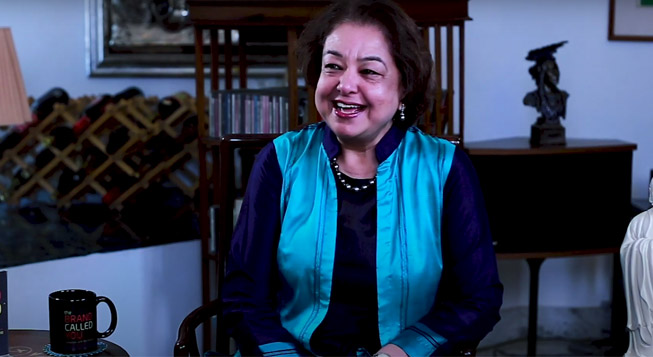Podcast: Play in new window | Download
Follow TBCY RSS
Vera Garg is an historian with a B.A. and M.A. in history. She also pursued her M.Phil at JNU but could not complete it as she got married midway through it. She teaches at the American Embassy School in Delhi and also heads their community service.
With decades of experience in the fields of history and education, Vera has novel insights into the education space. She says history is a subject that encompasses almost all subjects. “Even if one is learning science, it is important to know the history of science.”
She further stresses the importance of learning history. According to her, not knowing anything about history is much like a leaf not knowing the tree or the tree separated from its roots. Vera also conducts history walks in Delhi for people who are interested and passionately believes that every person needs to have some understanding of it. She also forayed into education because she wanted to make a change.
On the differences between teaching at school vs college
Vera found teaching in college much more challenging and also impersonal. She recounts her time teaching at St. Xavier’s College, Kolkata and feeling no sense of connection with the students. In high school, she notes, it is much more personal with opportunities to be involved with the students.
“School teaching is far more rewarding.”
How are millennials changing the world
Having been a teacher for a long time, Vera interacts with millennials almost daily. She is in awe of them and thinks that they are much more value-oriented than the previous generations. She notes how environmentally conscious most of them are and how important it is to be assigned to a cause to stay productive and out of trouble.
“Despite being a teacher, I learn from them everyday.”
How is IB different from traditional schools
Vera has been associated with the American Embassy School, one of the best in the world that is aligned with the International Baccalaureate program. Vera is a strong believer in the Baccalaureate system because she thinks it promotes critical thinking. She thinks it is an improvement over the marks system in traditional Indian schools and cites an example. “In history, students have to be able to defend their arguments but there is no right or wrong answer. As long as they can give evidence backed by analysis and some historiography, they can score the highest marks. As opposed to fixed answers and strict marks, students are graded on a scale of 1 to 7.”
Vera herself has 2 sons, one who attended IB and one who did not. The former had a headstart in college as he was used to writing research papers and citing his opinions.
When asked about the rise in literacy in India, she quips, “Literacy is just reading and writing. But can people code and decode? That’s very important.”
She does however have a semi-prejudicial remark to make, which she says laughingly – “Indians have good genes. We routinely produce brilliant minds who can go ahead and do well abroad.”
On community service and recycling
Community service is now an integral part of Vera’s life, but it only started by chance. She had to choose something extra to do at AES and while thinking about the various ways she could utilize her time and energy, she felt like recycling was the way to go. However, she only became passionate about it once she started researching and executing it.
“I feel much like Jinnah. He just happened to be in the right place at the right time but was credited as being the Father of Pakistan. Similarly, I just chanced upon recycling while looking for something to do.”
Today, she has involved her entire community into recycling at home. She separates compostable waste and turns it into manure for her garden. People in her community have started doing the same and she feels like if she could create a change in even 100 people, it would have a spiral effect which is exactly what the country needs.
On gender balance
Vera is a passionate advocate for gender equality. She works with organizations like Teach for India and regularly sees instances of gender imbalance. “When a brother and sister come to class, the sister comes bare-foot because the male receives the privilege of wearing shoes.” She is deeply disturbed by such occurrences and strongly believes in the education of the girl child.
“When you educate a male, you educate just him. When you educate a woman, you educate the family.”


